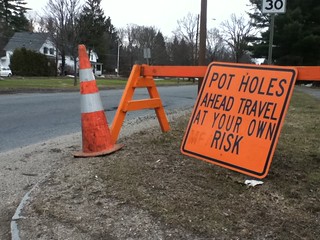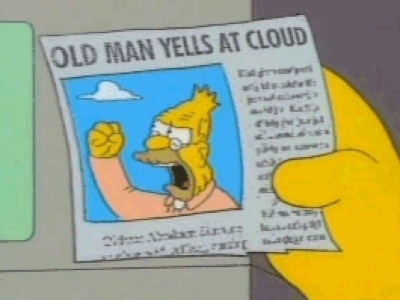Hey, you kids! Pull up your pants and turn down that loud music! An old lawyer is here to condescendingly tell you how to stop with your popular, effective actions against climate change, and instead take up his ineffective, wildly unpopular niche solution that won't at all solve global warming!
The fossil fuel divestment movement has gotten
hundreds of colleges, communities, religious institutions and foundations to commit to selling off stocks, bonds or funds that invest in climate-disrupting fuels.
But Boston Globe columnist Tom Keane is here to tell you
divestment is stupid and all those kids are stupid too:
It’s easy to question the students’ tactics. For one, there’s a whiff of hypocrisy. The same students doubtless drive cars, ride the bus, and fly in airplanes, all powered by petrochemicals. Demanding divestment gives the illusion of clean hands without actually having to wash up. Of course, almost all of us who worry about climate change are hypocrites as well. Fossil fuels are ubiquitous and necessary. Yes, Al Gore would jet from country to country telling folks, basically, not to fly in jets. But how else could he get there?
If you go anywhere you're killing the planet! But we have to go places to get anywhere! I have no idea what Keane's point is here. College kids are ruining the planet by taking public transportation?
In any event, occupying presidents’ offices won’t do much to help the environment.
What did protesting ever solve, anyway?
What could? Conservation.
"Mookie Betts won't win the World Series for the Red Sox. What could? A well-constructed 25-man roster and a deep farm system." Is that really a fair standard for judging Betts' effectiveness?
Clearly Keane doesn't understand divestment and hasn't asked anyone to explain it to him. What do you expect, a Boston Globe columnist to leave his office and talk to people who don't agree with him?
To understand divestment, go read
David Roberts at Vox:
Nobody thinks the divestment movement can hurt fossil fuel companies in any direct financial way, but that's not what it seeks to do. Rather, it seeks to put mainstream institutions on record defining climate mitigation as a moral imperative, to create social consensus that inaction is not neutral — it is immoral.
Green technocrats have tried to sell Washington on solutions like cap & trade and carbon taxes using economic framings like green jobs, investment and risk management. They've lost to every time to polluters using their big money advantage to win the partisan political game. Divestment is an attempt to re-take the moral high ground - to change the game.
But folks like Keane act like all we need is an even wonkier, less popular fix:
The obvious answer is to artificially raise the price of gas by imposing taxes.
It’s an old idea. Europe does it, which is why the price of gas there is upwards of $10 gallon (and why Europeans have smaller cars and drive less). It’s resisted in the United State by both the right and left: Higher taxes are seen as just more fuel for a bigger public sector and they also disproportionately hurt those of more modest means. There is a way around those problems however. Collect the taxes, but then rebate them back. People’s pocketbooks wouldn’t be any lighter, but they would still become much more frugal in their use of gasoline.
It’s a good solution — maybe the only solution. Rather than spending their time in sit-ins, it’s an idea college students might want to rally around.
Look, I'm all for increasing the gas tax - it would raise needed revenue while adding some pain to burning a fossil fuel. But the federal and Massachusetts gas tax combined are a pathetic 44 cents a gallon. Gas is at $2.58 now. Even if you doubled the tax, gas would still be about $3 a gallon. How would that reduce gas use? Gas at $4 a gallon barely made a dent in driving. The truth is that we still subsidize driving in a hundred other ways, from untolled highways to free or low-cost on-street parking to housing policies that encourage sprawl.
Raising the gas tax is an unpopular idea that won't solve the problem, especially since it completely ignores the majority of carbon emissions that come from electricity, industrial, agricultural and
other sources.
With Massachusetts Gov. Charlie Baker's administration pushing new & expanded fracked gas pipelines that will
make global warming even worse, we need bigger-picture ideas that get to the urgency of ending our fossil fuel dependence entirely.
That's where divestment comes in.
 CNN reports the unprecedented floods in Texas - exactly the kind climate scientists have been saying we'll see more of in a warming world - are really harshing the science denial of Sen. Ted Cruz (R-TX):
CNN reports the unprecedented floods in Texas - exactly the kind climate scientists have been saying we'll see more of in a warming world - are really harshing the science denial of Sen. Ted Cruz (R-TX):


/cdn0.vox-cdn.com/uploads/chorus_asset/file/3698752/ar5-scenarios.png)

